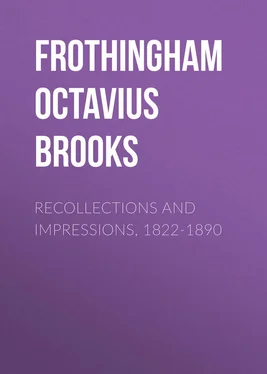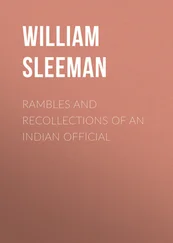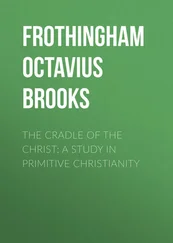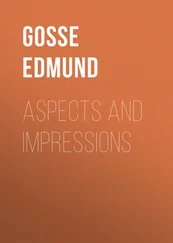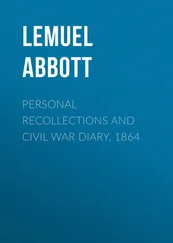Octavius Frothingham - Recollections and Impressions, 1822-1890
Здесь есть возможность читать онлайн «Octavius Frothingham - Recollections and Impressions, 1822-1890» — ознакомительный отрывок электронной книги совершенно бесплатно, а после прочтения отрывка купить полную версию. В некоторых случаях можно слушать аудио, скачать через торрент в формате fb2 и присутствует краткое содержание. Жанр: foreign_antique, foreign_prose, на английском языке. Описание произведения, (предисловие) а так же отзывы посетителей доступны на портале библиотеки ЛибКат.
- Название:Recollections and Impressions, 1822-1890
- Автор:
- Жанр:
- Год:неизвестен
- ISBN:нет данных
- Рейтинг книги:3 / 5. Голосов: 1
-
Избранное:Добавить в избранное
- Отзывы:
-
Ваша оценка:
- 60
- 1
- 2
- 3
- 4
- 5
Recollections and Impressions, 1822-1890: краткое содержание, описание и аннотация
Предлагаем к чтению аннотацию, описание, краткое содержание или предисловие (зависит от того, что написал сам автор книги «Recollections and Impressions, 1822-1890»). Если вы не нашли необходимую информацию о книге — напишите в комментариях, мы постараемся отыскать её.
Recollections and Impressions, 1822-1890 — читать онлайн ознакомительный отрывок
Ниже представлен текст книги, разбитый по страницам. Система сохранения места последней прочитанной страницы, позволяет с удобством читать онлайн бесплатно книгу «Recollections and Impressions, 1822-1890», без необходимости каждый раз заново искать на чём Вы остановились. Поставьте закладку, и сможете в любой момент перейти на страницу, на которой закончили чтение.
Интервал:
Закладка:
There can be no greater mistake than to call Theodore Parker a Deist; than to class Theodore Parker with the Deists. He was utterly unlike Chubb or Shaftesbury, Herbert of Cherbury or Bolingbroke. Even the most philosophical of them had nothing in common with him. Hume and Voltaire, for instance, were utterly unlike him. They, it is true, believed in a God, the "First Cause," the "Author of Nature," the "Supreme Being," and in a future life. But their belief was merely logical and mechanical, his was vital; he believed in the real, living, immanent Deity. They thought that religion was an imposition, a policy of the priests, who played upon the fears of mankind; he believed that religion was a working power in the world, the origin of the highest achievement, the soul of all aspiration. They had no faith in the direct communication of the "Supreme Mind" with the soul of man; he believed in the infinite genius of man, and in the direct communication of the absolute intelligence. They thought of justice as a contrivance for securing happiness; he thought of it as the law of life. One of Mr. Parker's friends ascribed to him a gorgeous imagination; if he had it, it is a surprise that it should have been so completely suppressed as it was, for his taste in pictures and in poetry was very questionable. His want of speculative talent probably helped him with the people. Whether he formulated his thoughts is uncertain. Such was not his genius. He was a constructive, not a destructive. It was his faith that he criticised the Bible in order that he might release its piety and righteousness; that he tore in pieces the creeds in order to emancipate the secrets of divinity.
It is useless to conjecture what Parker might have been had he lived. That he would have held to his primary convictions is almost certain; it is quite certain that he would have loved mental liberty. He would have been a great power in our Civil War; he would probably have been a leader in the free religious movement. Parker, when I first knew him, was in full life and vigor. He had gone to Boston a short time before my ordination in 1847, and had before him a long future of usefulness. All the exigencies in which he might have been conspicuous were distant. That the effect of such a man on me and my connections was exceedingly great is not strange. It would have been strange had it been otherwise. In sermon, prayer, private conversations my convictions came out. That the people were disappointed may be assumed, but they were kind, generous, and patient. The congregations did not fall off; there was little violence or even vehement expostulation. But the position was not comfortable, and when an invitation came from Jersey City to found a new Society, I accepted it at once. It had been a dream of Dr. Bellows to establish a Society at that place, and, learning that I was in search of another sphere of activity, he asked me to undertake the work. This was seconded by a cordial representation from Jersey City itself, on the part of some who were Dr. Bellows' own parishioners. The uprooting was not easy, for Salem had become endeared to me as the first scene of my ministry, a place where I could be useful in many ways, and which contained a delightful society; an established, well-furnished town, with historic associations; a country centre, an agreeable situation. But the waters were getting still there, and the sentiment of the past was getting to over-weigh the promises of the future.
VI.
JERSEY CITY
Jersey City, to which I went directly from Salem, was a very different place from what it is now; smaller and perhaps pleasanter. Where now is a large city, a few years ago was but a village. Now it is a manufacturing place, with great establishments, foundries, machine-shops, banks, insurance companies, newspapers, more than forty schools, and more than sixty churches. Then it was a large town, though it was nominally a city (incorporated in 1820), with a population of about twenty thousand, the increase being chiefly due to the annexation of suburbs, not to its own vital growth. It was substantially rural in character, with extensive meadows, broad avenues; a place of residence largely, the gentlemen living there and doing business in New York. There were a few Unitarians, a few Universalists, but there was no organized Unitarian society before I went there. A great many cultivated people resided in this place. There was wealth, culture, and interest in social matters. A meeting-house was built for me and dedicated to a large, rational faith.
The chief peculiarity of my ministry there was the disuse of the communion service. This rite I had thought a great deal about in Salem. There had been, then, a well-meant proposal on the part of the pastor to make an alteration in the form of administering the communion service. The custom had been (quite an incidental one, for the usage was by no means the same in all the churches of the denomination) to thrust the rite in once a month, between the morning worship and dinner time, and to offer it then to none but the church-members, who composed but a small part of the congregation. As a consequence of this arrangement, the observance became formal, dry, short, and tiresome. To the majority of the Society it seemed a mystical ceremony with which they had no concern, while those who stayed to take part in it, wearied already by the preceding exercises, and hungry for their mid-day meal, gave to it but half-hearted attention. The observance was thus worse than thrown away; for, in addition to the loss of an opportunity for spiritual impression, a dangerous kind of self-righteousness was encouraged in the few church-members, who regarded themselves as in some way set apart from their fellow-sinners, either as having made confession of faith or as being subjects of a peculiar experience. To impart freshness to the rite, and at the same time to extend its usefulness as a "means of grace," the minister proposed to celebrate it less frequently (once in two or three months), to substitute it in place of the usual afternoon meeting, to make special preparation for it by the co-operation of the choir, and to throw it open to as many as might choose to come, be they church members or not. The suggestion met with feeble response, and that chiefly from young people who had hitherto stayed away out of a laudable feeling of modesty, not wishing to remain when their elders and betters went out, and not thinking themselves good enough to partake of a special privilege. The "communicants," as a rule, set their faces against the innovation, perhaps because they were secretly persuaded that the change portended the secularizing of Christianity by a removal of the barrier that divided the church from the world, possibly because they wished to retain an exclusive prerogative which had always marked the "elect."
The matter was not pressed; the routine went on as before; the minister did his best to render the service impressive and interesting. But his studies and meditations led him to the conclusion that the observance had no place in the Unitarian system; that it was a mere formality, without an excuse for being; that it contained no idea or sentiment that was not expressed in the ordinary worship; that it was a remnant of an otherwise discarded form of Christianity, where it had a peculiar significance; that it was the last attenuation of the Roman sacrament of transubstantiation; that it ought to be dropped from every scheme of liberal faith as an illogical adjunct, a harmful excrescence, a hindrance, in short. No whisper of these doubts was breathed at the time, but the pastor's silence allowed the scepticism to strike the deeper root in his mind. Mr. Emerson's departure from his parish, on the ground that he could no longer administer the communion rite according to the usage of the sect, had occurred many years before this, but was still remembered in discussion and talk. Theodore Parker had no communion; but he was an established leader of heresy, and did not furnish an example. Many, agreeing with Emerson's reasoning, disapproved of his course in resigning his pulpit rather than continue to administer the bread and wine. He himself advised others to hold on to the observance, if they could, hoping for the time when it might be universally vivified by faith. Some might do it as it was. The congregations would, it is likely, without exception, have decided as his did, to lose their minister sooner than their "Supper." Some years later, on passing through Boston on my way to another scene of labor, I called on a distinguished clergyman who had taken a part in my ordination, and was asked by him what I intended to do in my new parish with regard to the communion. I replied that it was not my purpose to have it, "You cannot give it up," he said; "it is stronger than any of us. I should drop it if I dared, for there is nothing real in it that is not in the general service, but I am afraid to try. I shall watch your experiment with interest, but without expectation of its success." "Very well," I replied, "we shall see." The experiment was tried and succeeded. For four years I had no communion, and not a word was said about it. On leaving for New York, several of my friends, who had been accustomed to the ceremony all their lives, were asked if they did not think it would be wise to reinstate the rite. To my surprise, they with one voice said that there was no need of it, that the Society got along perfectly well without it. It is needless to say that in New York the observance was never celebrated.
Читать дальшеИнтервал:
Закладка:
Похожие книги на «Recollections and Impressions, 1822-1890»
Представляем Вашему вниманию похожие книги на «Recollections and Impressions, 1822-1890» списком для выбора. Мы отобрали схожую по названию и смыслу литературу в надежде предоставить читателям больше вариантов отыскать новые, интересные, ещё непрочитанные произведения.
Обсуждение, отзывы о книге «Recollections and Impressions, 1822-1890» и просто собственные мнения читателей. Оставьте ваши комментарии, напишите, что Вы думаете о произведении, его смысле или главных героях. Укажите что конкретно понравилось, а что нет, и почему Вы так считаете.
